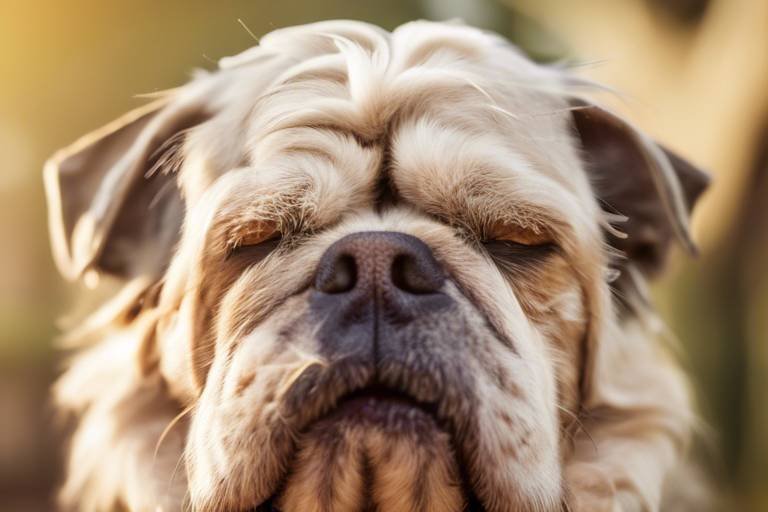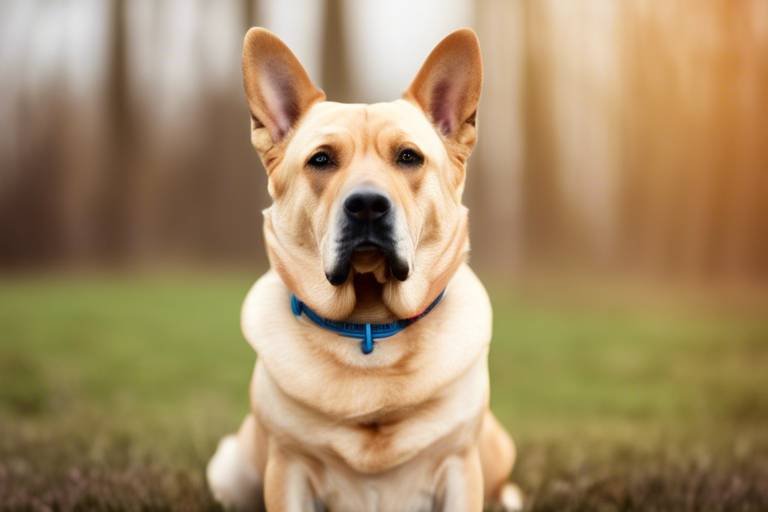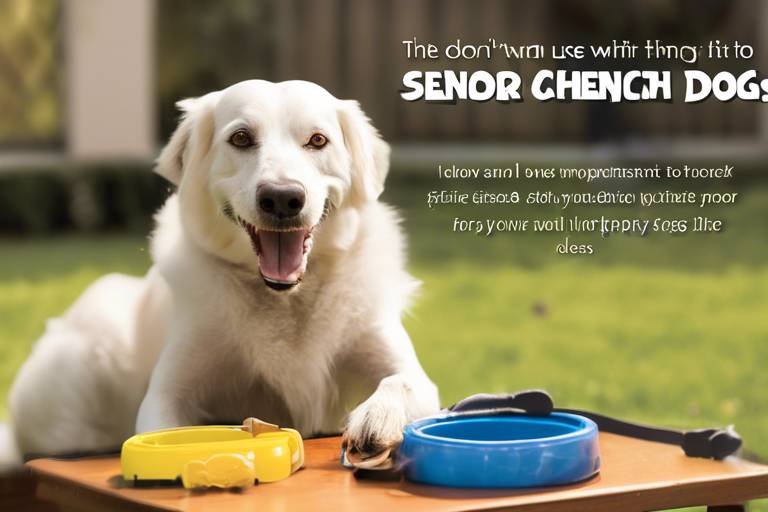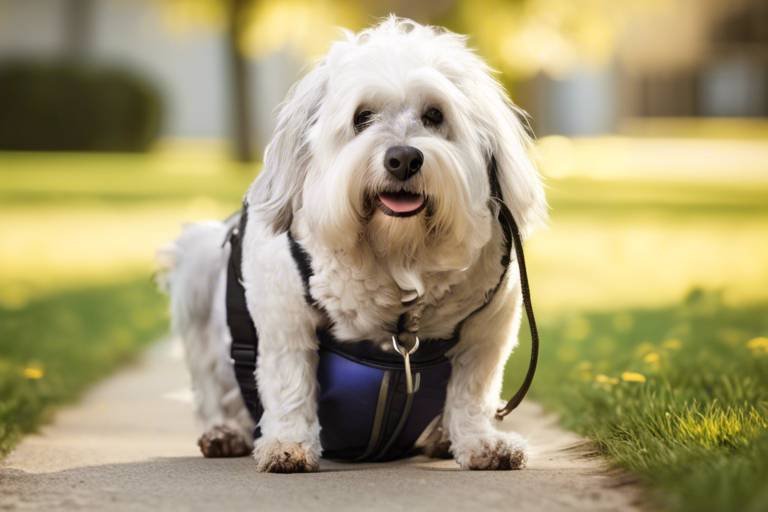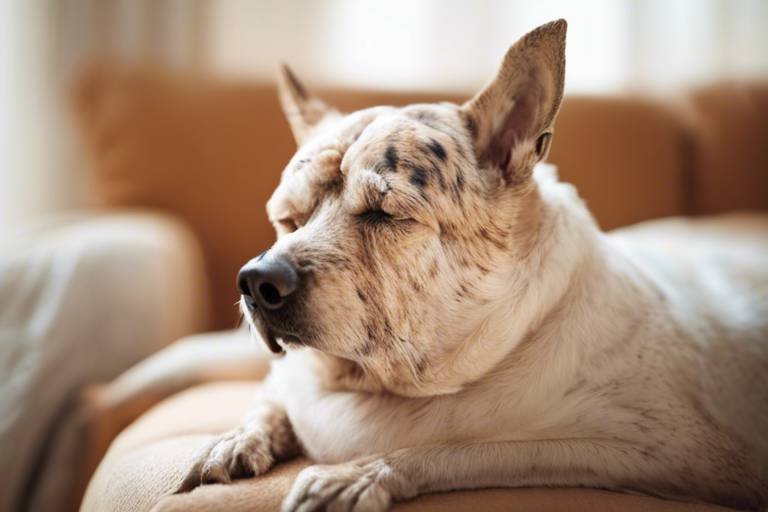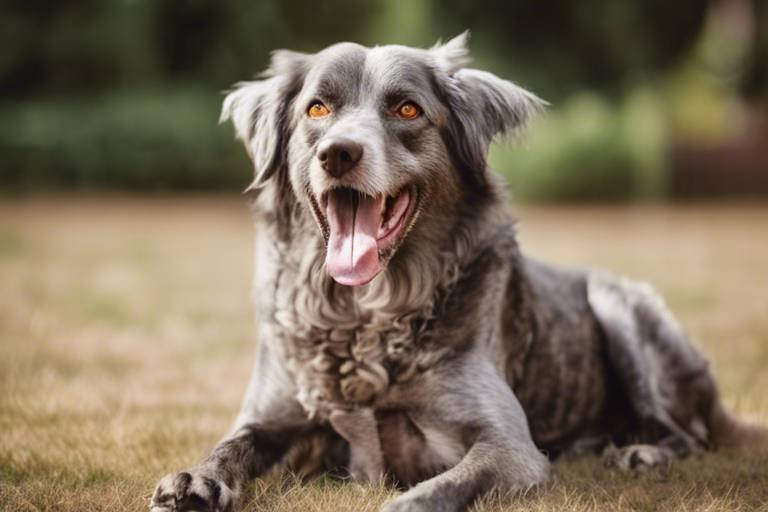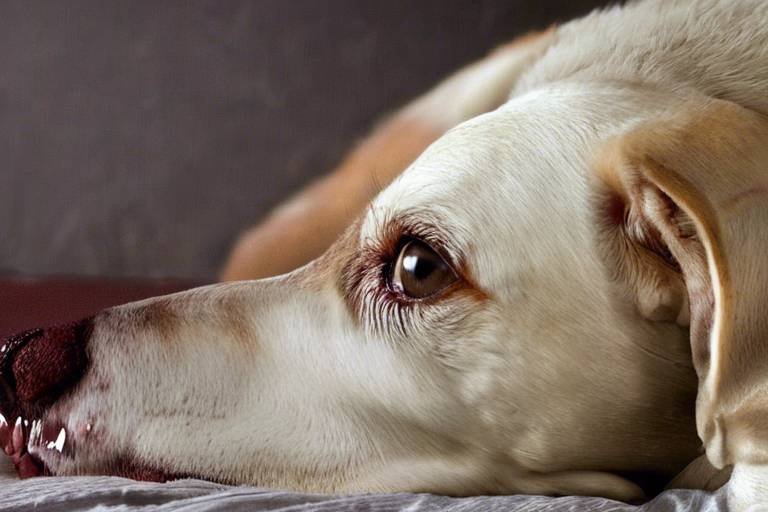Transitioning to a Senior Pet Diet - What You Need to Know
As our beloved furry companions age, their dietary needs shift significantly, much like how our own nutritional requirements change over the years. Transitioning to a senior pet diet is not just a matter of switching food; it's about ensuring that our pets maintain their health and vitality in their golden years. Just like how we might need to adjust our diets to accommodate changing lifestyles, senior pets require specific nutrients to support their aging bodies. But what exactly does this transition entail? Let’s dive into the essential considerations that every pet owner should keep in mind to ensure a smooth and healthy transition.
Understanding the specific nutritional requirements of senior pets is crucial for their health. As pets age, their bodies become less efficient at processing certain nutrients, which can lead to deficiencies if not addressed. Senior pets typically need diets that are lower in calories but higher in fiber to aid digestion. Additionally, they require adequate protein to maintain muscle mass, as well as essential fatty acids to support skin and coat health. Antioxidants are also vital, as they can help combat the oxidative stress that contributes to aging. In essence, a balanced diet for senior pets should include:
- High-quality protein sources to support muscle maintenance.
- Increased fiber to promote healthy digestion.
- Essential fatty acids for skin and coat health.
- Antioxidants to combat aging effects.
By focusing on these key nutrients, you can help your senior pet thrive and enjoy a better quality of life.
As pets age, they often face various health challenges that can significantly impact their quality of life. Common issues include arthritis, kidney disease, and dental problems. It’s essential to recognize that diet plays a crucial role in managing these conditions. For instance, pets with arthritis may benefit from anti-inflammatory diets that include omega-3 fatty acids, while those with kidney issues might require diets lower in protein and phosphorus.
Obesity is a significant concern for aging pets. Just like humans, pets can become less active as they age, leading to weight gain. Identifying obesity in your pet is vital; a simple way to do this is by checking their body condition score. You should be able to feel their ribs without too much pressure, and their waist should be visible when viewed from above. If your pet is overweight, dietary adjustments are necessary to maintain a healthy weight.
As pets age, their caloric needs change. In general, senior pets require fewer calories than their younger counterparts due to decreased activity levels. To calculate the appropriate caloric intake for your senior pet, consider their weight, activity level, and overall health. A good starting point is to reduce their daily caloric intake by about 20% compared to their previous diet. However, it's always best to consult your veterinarian for personalized recommendations.
Effective weight management strategies can help senior pets stay fit and healthy. Here are some practical tips:
- Controlled Portions: Measure your pet's food to avoid overfeeding.
- Regular Exercise: Encourage light exercise, such as short walks, to keep them active.
- Healthy Treats: Opt for low-calorie treats or fruits and vegetables as snacks.
Implementing these strategies can significantly improve your pet's overall health and well-being.
Dental health is vital for senior pets. As they age, dental issues can lead to pain and discomfort, affecting their ability to eat. A proper diet can impact oral health positively. Look for senior pet food that includes dental care benefits, such as kibble designed to reduce plaque and tartar buildup. Regular dental check-ups are also essential to keep your pet’s teeth and gums healthy.
Selecting the appropriate food for senior pets is essential. With so many options available, it can be overwhelming. When choosing a senior pet diet, consider factors such as your pet's specific health needs, preferences, and any allergies they may have. Consulting with your veterinarian can provide valuable insights tailored to your pet’s unique situation.
Understanding pet food labels is crucial for making informed decisions. Look for high-quality ingredients and avoid foods with excessive fillers or artificial additives. A good rule of thumb is to choose foods where protein sources are listed first, indicating that they are the primary ingredient. Familiarizing yourself with common terms can empower you to make better choices for your furry friend.
Deciding between homemade diets and commercial foods can be challenging. Homemade diets allow for complete control over ingredients but require careful planning to ensure nutritional balance. On the other hand, commercial foods are formulated to meet specific dietary needs and can be more convenient. Weighing the benefits and drawbacks of each option can help you choose the best fit for your senior pet.
1. How do I know if my pet needs a senior diet?
If your pet is over 7 years old and showing signs of aging such as decreased activity or weight gain, it may be time to consider a senior diet.
2. Can I mix senior food with regular pet food?
While it's generally not recommended to mix diets, transitioning gradually to senior food can be beneficial. Consult your vet for guidance.
3. How often should I feed my senior pet?
Feeding schedules can vary, but many senior pets benefit from smaller, more frequent meals throughout the day.

Nutritional Needs of Senior Pets
As our beloved furry friends age, their nutritional needs evolve significantly. Understanding these changes is crucial for maintaining their health and happiness. Just like we need different foods as we grow older, senior pets require specific nutrients to support their aging bodies. It's essential to focus on a balanced diet that caters to their unique requirements. So, what are these essential nutrients? Let's break it down.
First and foremost, senior pets often benefit from higher protein levels. As they age, their muscle mass tends to decrease, and protein plays a vital role in maintaining muscle health and overall strength. Look for pet foods that list quality protein sources, such as chicken, fish, or lamb, as the primary ingredient. Additionally, incorporating omega-3 fatty acids can help reduce inflammation and support joint health, making your pet feel more comfortable as they age.
Next up is fiber! Older pets can experience digestive issues, so a diet rich in fiber can help keep their digestive systems running smoothly. High-fiber foods can also assist in weight management by making your pet feel fuller without adding too many calories. It's like adding more air to a balloon; it expands but doesn't weigh it down!
Moreover, don’t forget about antioxidants! These magical compounds help combat oxidative stress in senior pets, which can lead to chronic diseases. Look for ingredients like blueberries, carrots, and spinach in their diet. These not only provide essential vitamins but also help boost their immune system, keeping them vibrant and active.
Finally, hydration is key! Older pets may not drink as much water as they should, which can lead to dehydration. Incorporating wet food into their diet can help increase their fluid intake. It's like giving them a refreshing drink with their meal—who wouldn't love that?
In summary, transitioning to a senior pet diet means focusing on:
- High-quality protein to maintain muscle mass.
- Omega-3 fatty acids for joint health.
- Fiber for digestive health.
- Antioxidants to support their immune system.
- Hydration through wet food options.
By keeping these nutritional needs in mind, you can ensure that your senior pet enjoys their golden years with vitality and joy. Remember, a little extra care in their diet can make a world of difference in their overall well-being!

Common Health Issues in Senior Pets
As our furry companions age, they often face a variety of health challenges that can significantly impact their quality of life. Understanding these common health issues is crucial for pet owners who want to provide the best care for their senior pets. Just like humans, pets can experience a range of conditions that come with aging, and being proactive about their health can make all the difference. From joint problems to heart disease, let's explore some of the most prevalent health concerns in senior pets and how a proper diet can help manage these issues.
One of the most common health problems seen in senior pets is arthritis. This degenerative joint disease leads to pain and stiffness, making it difficult for pets to move around comfortably. It’s essential to monitor your pet’s mobility and consult your veterinarian if you notice any changes in their activity levels. A diet rich in omega-3 fatty acids can be beneficial, as these nutrients help reduce inflammation and support joint health.
Another significant concern is kidney disease. As pets age, their kidneys may not function as effectively, leading to a buildup of toxins in the body. Symptoms can include increased thirst, frequent urination, and weight loss. A specialized diet low in protein and phosphorus can help manage kidney function and improve your pet's overall well-being. Regular veterinary check-ups are vital for early detection and management of this condition.
Dental issues are also prevalent in senior pets. Poor dental health can lead to serious complications, including infections and organ damage. A diet that includes dental care formulas or crunchy kibble can help reduce plaque buildup. Additionally, regular dental check-ups and cleanings are essential to maintain your pet’s oral health.
Lastly, obesity is a growing concern for senior pets. Many pet owners mistakenly believe that their older pets need more food, but in reality, their metabolism often slows down, and they require fewer calories. Keeping an eye on your pet's weight and adjusting their diet accordingly can prevent obesity-related issues like diabetes and heart disease. A balanced diet, combined with regular exercise, can help keep your senior pet fit and healthy.
In summary, being aware of these common health issues allows pet owners to take a proactive approach to their senior pets’ health. Regular veterinary visits, a tailored diet, and attentive care can significantly improve the quality of life for aging pets. Remember, the right nutrition can be a game-changer in managing these conditions, so always consult your vet when making dietary changes.
- What are the signs my senior pet may be experiencing health issues?
Look for changes in behavior, mobility, eating habits, or weight. If you notice any significant changes, consult your veterinarian. - How can I help my pet maintain a healthy weight?
Monitor portion sizes, provide regular exercise, and choose a diet specifically formulated for senior pets to help manage their weight. - Is it necessary to change my pet's diet as they age?
Yes, senior pets have different nutritional needs than younger pets, so it's important to transition to a diet that supports their health.
Obesity in Senior Pets
As our beloved furry companions age, one of the most pressing concerns that pet owners face is obesity. It's not just a cosmetic issue; obesity can lead to serious health problems that can significantly impact your pet's quality of life. But how do you know if your senior pet is overweight? The signs can be subtle, especially in breeds that are naturally stocky or fluffy. A good rule of thumb is to check if you can easily feel your pet's ribs without having to press too hard. If you're struggling to find those ribs, it might be time to rethink their diet.
Weight gain in senior pets is often a result of a combination of factors, including decreased activity levels, slower metabolism, and the tendency to overindulge in treats. Just like us, pets don’t burn calories as efficiently as they age. This is why it's crucial to adjust their diet accordingly. A high-calorie diet that worked wonders when they were younger could become a recipe for disaster in their golden years. So, what can you do to help your pet maintain a healthy weight?
First, it's essential to look at the type of food you're providing. Many commercial pet foods are marketed towards senior pets, but not all of them are created equal. Look for options that are specifically formulated for weight management, as these will typically have fewer calories and more fiber to help your pet feel full without the extra calories. Portion control is another vital aspect of managing your pet's weight. You might be surprised to learn that the serving sizes on the package are often just guidelines. It's a good idea to consult your vet for a personalized feeding plan based on your pet's specific needs.
Incorporating regular exercise into your pet's routine is also crucial. While they may not be as spry as they once were, even short, gentle walks can help keep their weight in check. Think of it this way: just like we need to keep our bodies moving to stay healthy, our pets need the same attention. Try to engage in fun activities that stimulate both their mind and body. You could play a game of fetch or even set up an obstacle course in your backyard!
To help you visualize the importance of managing your senior pet's weight, here’s a simple table that outlines the potential health risks associated with obesity:
| Health Risk | Description |
|---|---|
| Diabetes | Excess weight can lead to insulin resistance, increasing the risk of diabetes. |
| Arthritis | Extra weight puts additional strain on joints, worsening arthritis symptoms. |
| Heart Disease | Obesity can lead to higher blood pressure and heart disease. |
| Reduced Lifespan | Studies show that overweight pets often have shorter lifespans. |
In conclusion, managing obesity in senior pets is a multifaceted approach that includes proper nutrition, portion control, and regular exercise. By being proactive and attentive to your pet's needs, you can help them lead a healthier, happier life as they age. Remember, a little effort goes a long way in ensuring that your furry friend remains vibrant and full of life!
- How can I tell if my pet is overweight? Look for visual signs like difficulty feeling ribs, a rounded belly, and lack of definition in the waist. A vet can also provide a more accurate assessment.
- What should I feed my senior pet? Look for high-quality senior pet food that is low in calories but high in essential nutrients. Consult your vet for specific recommendations.
- How much exercise does my senior pet need? While every pet is different, aim for short walks and gentle play sessions several times a week.
- Is it safe to put my senior pet on a diet? Yes, but it's best to consult with your veterinarian to create a safe and effective weight loss plan tailored to your pet's health.
Caloric Needs
As our furry friends age, their bodies undergo a myriad of changes that significantly impact their . Just like us, senior pets experience a decrease in metabolism, which means they require fewer calories than they did in their younger years. This shift is crucial to understand, as overfeeding can lead to unwanted weight gain and associated health problems. So, how do we determine the right caloric intake for our beloved companions?
First, it's essential to consider the pet's weight, activity level, and overall health. A general guideline is to feed senior pets about 20-30% fewer calories than what they needed in their prime. However, this is not a one-size-fits-all approach. Each pet is unique, and their caloric requirements can vary widely. To get started, you can refer to the following table that outlines a simple way to estimate daily caloric needs based on weight:
| Weight of Pet (lbs) | Estimated Daily Calories |
|---|---|
| 5 lbs | 100-150 calories |
| 10 lbs | 150-200 calories |
| 20 lbs | 300-350 calories |
| 30 lbs | 400-450 calories |
| 50 lbs | 600-700 calories |
To accurately calculate your pet's caloric needs, you can use the following formula: Resting Energy Requirement (RER) 70 x (body weight in kg)0.75. Once you have the RER, you can adjust it based on your pet's activity level. For instance, if your senior pet is mostly inactive, you might multiply the RER by 1.2-1.4. For slightly active pets, a multiplier of 1.5-1.8 is appropriate.
Another critical aspect to consider is the quality of calories. Not all calories are created equal! Senior pets benefit from diets that are rich in high-quality protein, healthy fats, and essential vitamins and minerals. These nutrients not only support their overall health but also help maintain muscle mass, which can diminish with age.
In addition to monitoring caloric intake, keeping an eye on your pet's weight is vital. Regular weigh-ins can help you determine if your pet is maintaining a healthy weight or if adjustments need to be made. Remember, gradual changes are key; sudden weight loss or gain can be harmful. If you're unsure about your pet's ideal weight or caloric needs, consulting with your veterinarian is always a wise choice.
In summary, understanding and adjusting your senior pet's caloric needs is essential for their health and well-being. By being mindful of their daily intake and focusing on high-quality nutrients, you can help ensure that your furry friend enjoys their golden years to the fullest!
Weight Management Strategies
Managing your senior pet's weight is not just about helping them look good; it's about ensuring they live a long, healthy life. As our furry friends age, their metabolism slows down, making it crucial to adopt effective weight management strategies. Have you ever noticed how your dog seems to lounge around more than they used to? This is a common sign that their activity level may be decreasing, which can lead to unwanted weight gain. So, what can you do to help?
First off, portion control is key. It might be tempting to give your pet that extra scoop of kibble or those few extra treats, but those little indulgences can add up quickly. Consider measuring their food and following the feeding guidelines on the pet food label. You can also consult your veterinarian for personalized recommendations based on your pet's specific needs. Remember, it's not just about how much they eat, but also what they eat. High-quality, nutrient-dense foods can help your pet feel full while still being lower in calories.
Another strategy is to incorporate regular exercise into their routine. Just like us, pets need to stay active to maintain a healthy weight. This could mean more frequent walks, engaging in playtime with toys, or even exploring new activities like agility training. If your pet is not used to exercising, start slow and gradually increase the intensity and duration. Think of it as a fun bonding time rather than a chore. After all, who doesn’t love a good game of fetch?
Additionally, consider using interactive feeding methods. Puzzle feeders and treat-dispensing toys can turn mealtime into a fun challenge for your pet. This not only slows down their eating but also stimulates their mind, keeping them engaged and active. You’d be surprised how much a little creativity can make a difference in your pet’s weight management journey.
Finally, keep an eye on their treats. While it’s great to reward your pet, it’s essential to choose healthy options. Look for low-calorie treats or consider using fruits and vegetables like carrots or green beans as tasty snacks. These alternatives can satisfy their craving without adding too many calories. Just remember to adjust their main meals accordingly to account for any treats given throughout the day.
In conclusion, managing your senior pet's weight is a multifaceted approach that combines proper nutrition, portion control, exercise, and thoughtful treat choices. By staying proactive and attentive to their needs, you can help your furry friend maintain a healthy weight, ensuring they enjoy their golden years to the fullest.
- How often should I exercise my senior pet?
It depends on their health and mobility, but aim for at least 30 minutes of activity each day, broken into shorter sessions if needed. - What are some signs my pet is overweight?
Look for a lack of waist, difficulty in feeling their ribs, and decreased energy levels. - Can I give my senior pet human food?
Some human foods are safe, but always check with your vet first to avoid harmful options. - How can I tell if my pet's food is appropriate for their age?
Check for age-specific formulas on the label and consult your veterinarian for advice.
Dental Health Considerations
When it comes to our beloved senior pets, dental health is often an overlooked aspect of their overall well-being. Just like humans, pets can suffer from various dental issues as they age, which can lead to serious health problems if not addressed. It's essential to understand how diet influences oral health and what specific factors to consider when selecting food for your senior furry friend.
First and foremost, poor dental hygiene can lead to periodontal disease, which is not only painful but can also affect other organs. When bacteria from the mouth enter the bloodstream, they can impact the heart, liver, and kidneys. This is why ensuring your pet has a diet that promotes good dental health is crucial. Senior pet foods often contain special ingredients designed to combat plaque and tartar buildup, helping to keep those pearly whites in check.
When choosing a senior diet, look for foods that include crunchy kibble or dental chews. These can help scrub your pet's teeth as they chew, effectively reducing the buildup of harmful bacteria. Additionally, some pet foods are formulated with specific nutrients like omega fatty acids, which can help reduce inflammation in the gums and promote overall oral health.
However, it's not just about the food. Regular dental check-ups with your veterinarian are vital. They can identify any potential issues early on and recommend professional cleanings if necessary. In between vet visits, consider incorporating dental treats into your pet's routine. These treats are designed to be both tasty and beneficial for their teeth, making it easier to keep their mouths healthy.
To summarize, here are some key considerations for maintaining your senior pet's dental health:
- Choose a senior diet with crunchy kibble or dental chews.
- Look for foods rich in omega fatty acids and other beneficial nutrients.
- Schedule regular dental check-ups with your veterinarian.
- Incorporate dental treats into their diet for additional support.
By being proactive about your senior pet's dental health, you can help them enjoy a happier, healthier life. Remember, a healthy mouth often leads to a healthy body, so don’t underestimate the power of a good diet and regular dental care!
Q: How often should I brush my senior pet's teeth?
A: Ideally, you should brush your pet's teeth daily. If that's not feasible, aim for at least a few times a week to help reduce plaque buildup.
Q: Are there specific ingredients I should look for in senior pet food?
A: Yes, look for ingredients that promote dental health, such as crunchy kibble, omega fatty acids, and dental-specific formulations.
Q: Can I use human toothpaste for my pet?
A: No, human toothpaste can be harmful to pets. Always use toothpaste specifically designed for pets.
Q: How can I tell if my pet has dental problems?
A: Signs include bad breath, difficulty eating, swollen gums, and excessive drooling. If you notice any of these symptoms, consult your veterinarian.

Choosing the Right Senior Pet Food
When it comes to selecting the right food for your senior pet, it’s akin to picking out the perfect outfit for a special occasion—comfort, style, and fit are all essential. Just like we humans need to adjust our diets as we age, our furry friends require a well-balanced diet tailored to their specific needs. With so many options available, it can feel overwhelming, but understanding what to look for can make the process a whole lot easier.
First and foremost, you’ll want to focus on the nutritional profile of the food. Senior pets typically require fewer calories than their younger counterparts, but they still need a diet rich in essential nutrients. Look for foods that are high in protein to help maintain muscle mass, as well as fiber to support digestive health. Additionally, ingredients like omega fatty acids are crucial for promoting a healthy coat and skin, while antioxidants can help boost their immune system.
Another important factor to consider is the texture of the food. As pets age, they may experience dental issues, making it difficult for them to chew hard kibble. In such cases, you might want to opt for softer, wet food options or even a mix of both to ensure they can eat comfortably. Always keep an eye out for grains and fillers—these can be detrimental to your pet’s health, leading to obesity and other health issues.
To help you navigate this decision, here’s a quick table outlining some key factors to consider when choosing senior pet food:
| Factor | Importance | What to Look For |
|---|---|---|
| Protein Content | Maintains muscle mass | High-quality animal proteins |
| Fiber | Supports digestion | Whole grains and vegetables |
| Fatty Acids | Promotes healthy skin and coat | Omega-3 and Omega-6 sources |
| Antioxidants | Boosts immune system | Fruits and vegetables |
Now, let’s talk about pet food labels. Understanding these labels is crucial for making informed decisions. You’ll want to look for specific terms like “complete and balanced,” which indicates that the food meets the nutritional standards set by the AAFCO (Association of American Feed Control Officials). If you see phrases like “formulated to meet” or “intended for,” it’s a sign that the food may not be as nutritionally complete as needed for your senior pet.
Lastly, the debate between homemade diets versus commercial foods is one that many pet owners grapple with. Homemade diets can be tailored specifically to your pet’s needs, but they require a lot of time, effort, and knowledge to ensure they are nutritionally adequate. On the other hand, commercial foods, especially high-quality brands, are formulated to provide all the necessary nutrients without the hassle of preparation. Weighing the pros and cons of each option will help you find the best fit for your furry companion.
In conclusion, choosing the right senior pet food is not just about filling a bowl; it’s about ensuring your beloved pet lives a long, healthy, and happy life. By paying attention to their specific dietary needs and understanding how to read labels, you can make informed choices that will keep them thriving in their golden years.
- How do I know if my pet needs a senior diet? If your pet is over the age of seven and shows signs of aging, such as decreased energy or weight gain, it may be time to transition to a senior diet.
- Can I mix senior food with regular food? Yes, but it’s best to gradually introduce the new food to avoid digestive upset.
- What should I do if my pet refuses to eat senior food? Consult your veterinarian to rule out any underlying health issues and consider trying different brands or flavors.
Reading Pet Food Labels
When it comes to choosing the right food for your senior pet, understanding pet food labels is essential. These labels are like a treasure map, guiding you to the best choices for your furry friend. But, let’s face it, they can often be overwhelming! With so many terms and ingredients listed, it’s easy to feel lost. So, how do you navigate this maze of information? First, start with the ingredient list. Ingredients are typically listed in descending order by weight, meaning the first few ingredients are the most significant. For senior pets, look for high-quality protein sources, like chicken or fish, as the first ingredient. This is crucial because, as pets age, they need more protein to maintain muscle mass.
Next, be on the lookout for added nutrients. Senior pets often require specific vitamins and minerals to support their aging bodies. Ingredients like glucosamine and chondroitin are fantastic for joint health, while omega fatty acids can help maintain a shiny coat and healthy skin. Additionally, check for antioxidants that can support their immune system. But don't just stop at the ingredients; take a closer look at the guaranteed analysis section, which provides information on the minimum percentages of crude protein and fat, as well as the maximum percentages of fiber and moisture. This section helps you understand the overall nutritional content of the food.
| Label Element | What to Look For |
|---|---|
| First Ingredient | High-quality protein source (e.g., chicken, fish) |
| Added Nutrients | Glucosamine, chondroitin, omega fatty acids |
| Guaranteed Analysis | Minimum protein and fat percentages; maximum fiber and moisture percentages |
Another important aspect to consider is the type of food. You’ll often see terms like “complete and balanced,” which means the food meets the nutritional levels established by the AAFCO (Association of American Feed Control Officials). This is a good sign that the food is formulated to provide your senior pet with the nutrients they need. However, be cautious of terms like “natural” or “holistic,” as these can be vague and don’t necessarily guarantee quality. It’s always better to stick with brands that provide clear, science-backed information about their products.
Lastly, don’t hesitate to consult your veterinarian when reading pet food labels. They can offer personalized advice based on your pet’s specific health needs and conditions. After all, your vet is your best ally in ensuring your pet enjoys a healthy and happy life. By taking the time to understand pet food labels, you’re not just feeding your pet; you’re investing in their health and longevity.
- What should I look for in senior pet food? Look for high-quality protein, added nutrients like glucosamine, and clear labeling that meets AAFCO standards.
- Are grain-free diets better for senior pets? Not necessarily; it depends on your pet's individual health needs. Consult your vet for the best diet.
- How can I tell if my pet is overweight? Check for a noticeable waist, feel their ribs without excess fat, and consult your vet for a professional assessment.
Homemade Diets vs. Commercial Foods
When it comes to feeding our beloved senior pets, the debate between homemade diets and commercial foods is a hot topic among pet owners. Each option has its own set of advantages and disadvantages, and understanding these can help you make the best decision for your furry friend. On one hand, homemade diets offer the benefit of complete control over ingredients, allowing you to tailor meals specifically to your pet’s needs. Imagine crafting a meal that’s not only nutritious but also free from preservatives and fillers—sounds appealing, right?
However, preparing homemade meals requires time, effort, and a solid understanding of your pet's nutritional needs. It’s essential to ensure that the diet is balanced and meets all the necessary vitamins and minerals. A poorly balanced homemade diet can lead to health issues over time. For instance, if you forget to include certain nutrients, your pet might suffer from deficiencies that could affect their overall health.
On the flip side, commercial pet foods are designed to meet the dietary requirements of pets, and many brands offer specialized formulas for senior pets. These foods are convenient, readily available, and often come with a wealth of research backing their formulations. However, the challenge lies in choosing a quality product. Not all commercial foods are created equal, and some may contain low-quality ingredients or unnecessary fillers. It’s crucial to read labels carefully to ensure you’re providing your pet with a nutritious option.
Let’s break down some key considerations when choosing between homemade diets and commercial foods:
- Convenience: Commercial foods are quick and easy to serve, while homemade diets require preparation time.
- Cost: Homemade meals can sometimes be more economical, but they may also require specific ingredients that can add up.
- Nutritional Balance: Commercial foods often provide balanced nutrition, while homemade diets require careful planning to meet all dietary needs.
- Quality Control: Homemade diets allow you to know exactly what your pet is eating, while commercial foods vary in quality.
Ultimately, the decision between homemade diets and commercial foods depends on your lifestyle, your pet’s specific health needs, and your ability to commit time to meal preparation. Consulting with your veterinarian is always a wise step to ensure that whichever route you choose, your senior pet receives the best possible nutrition.
Q: Can I mix homemade food with commercial food for my senior pet?
A: Yes, you can mix the two, but it’s essential to ensure that the homemade portion complements the nutritional profile of the commercial food.
Q: How do I know if my homemade diet is balanced?
A: It’s best to consult with a veterinarian or a pet nutritionist to ensure that your homemade meals include all necessary nutrients.
Q: Are there commercial foods specifically designed for senior pets?
A: Absolutely! Many brands offer formulas that cater specifically to the needs of senior pets, focusing on joint health, weight management, and digestibility.
Frequently Asked Questions
- What are the key nutritional needs for senior pets?
Senior pets require a balanced diet that includes high-quality protein, healthy fats, and essential vitamins and minerals. It's important to focus on ingredients that support joint health, maintain a healthy weight, and promote overall vitality. Look for foods rich in omega fatty acids, antioxidants, and fiber to help with digestion.
- How can I tell if my senior pet is overweight?
To determine if your senior pet is overweight, check for a visible waist when viewed from above and feel for their ribs. If you can't easily feel their ribs or if they have a sagging belly, they might be overweight. Regular vet check-ups can also help monitor their weight and overall health.
- What should I consider when choosing senior pet food?
When selecting senior pet food, consider factors such as ingredient quality, nutritional balance, and specific health needs of your pet. Look for foods that are formulated specifically for seniors and check for certifications or endorsements from veterinary nutritionists.
- Can I feed my senior pet homemade meals?
Yes, you can feed your senior pet homemade meals, but it's essential to ensure they receive a balanced diet. Consult with your veterinarian or a pet nutritionist to create recipes that meet your pet's specific nutritional needs and avoid harmful ingredients.
- How can I help my senior pet maintain a healthy weight?
To help your senior pet maintain a healthy weight, monitor their caloric intake and adjust portion sizes accordingly. Incorporate regular exercise, such as short walks or gentle playtime, and avoid giving too many treats. Consistency is key!
- What role does dental health play in a senior pet's diet?
Dental health is crucial for senior pets as it can affect their overall health and quality of life. A diet that includes crunchy kibble can help reduce plaque buildup, while dental treats specifically designed for oral care can promote healthy gums and teeth.
- How do I transition my pet to a senior diet?
Transitioning to a senior diet should be done gradually over 7-10 days. Start by mixing small amounts of the new food with their current food, gradually increasing the new food's proportion while decreasing the old food. This helps prevent digestive upset and allows your pet to adjust to the new flavors and textures.



